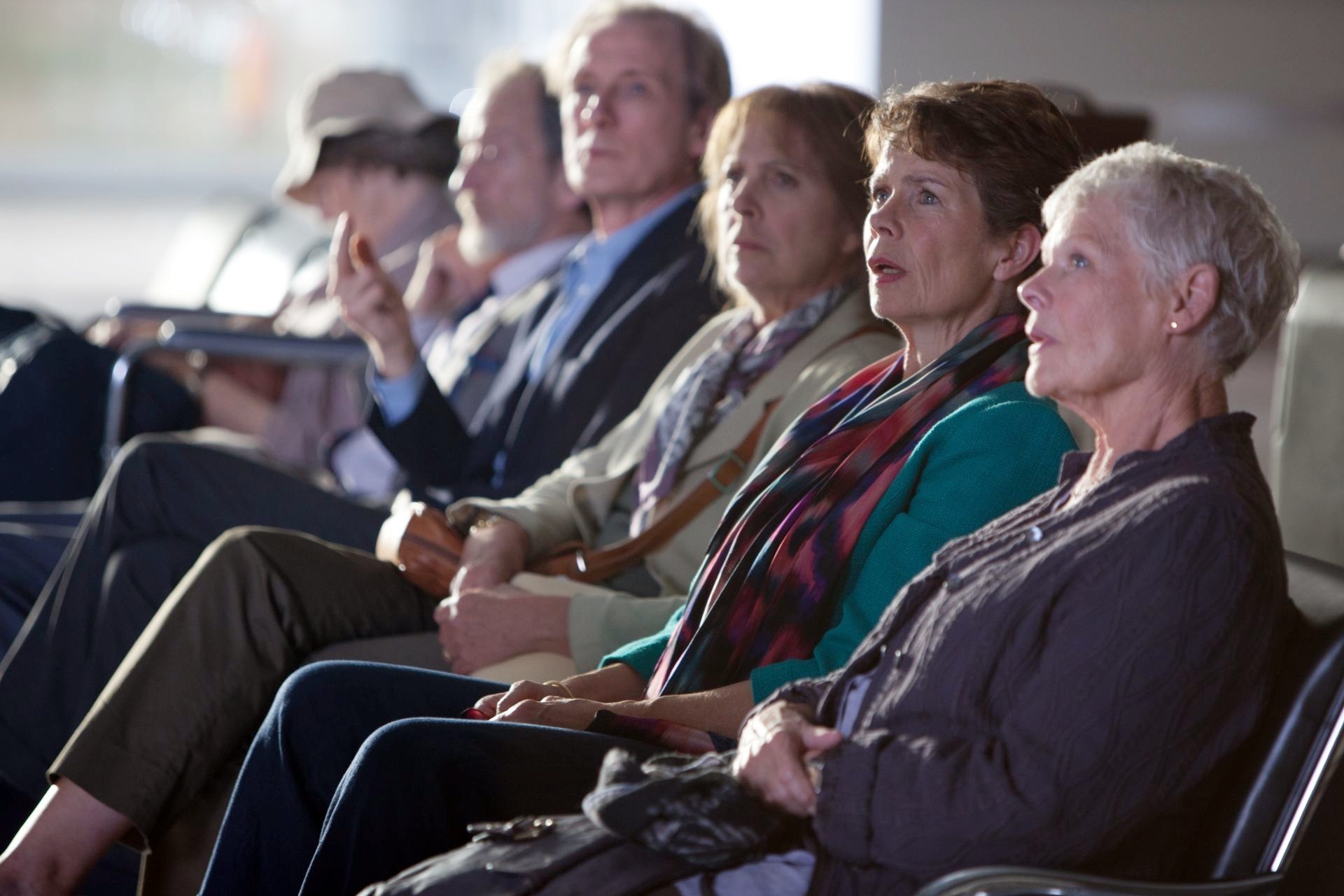The pleasures of seeing a first-rate British cast in a nicely photographed movie about late life rebirth cannot be underestimated. Indeed, The Best Exotic Marigold Hotel is a welcome antidote to the blockbuster summer movie season. As it turns out, audiences are going to see the film. And the majority of them are well above 50. Yes, Virginia, there is a Santa Claus.
In a potent statement about the realities of senior living in the modern world, seven aging Brits in various stages of personal crises answer an online ad and soon embark to Udiapur, India, home of an affordable retirement enclave named The Best Exotic Marigold Hotel (for the Elderly and Beautiful), purported to be a sumptuous haven for retirees. When they arrive, it’s a far different story.
These retirees include: Newly widowed Evelyn (Judi Dench), saddled with her late husband’s debt and a flat about to be foreclosed; Graham (Tom Wilkinson), a high court judge who walks away from a well-respected post to confront a painful past event; Muriel (Maggie Smith), a xenophobic former housekeeper in need of an affordable hip replacement; Douglas (Bill Nighy) and Jean (Penelope Wilton), broke after sinking their retirement into their daughter’s failed start-up; Madge (Celia Imrie), relegated to babysitting duty for her grandchildren and looking for a another shot at love; and randy Norman (Ronald Pickup), a fixture on the (much younger) singles scene, hunting for the perfect night of passion.
After a chance meeting at the airport, the group arrive to the boisterous and overwhelming color and energy of Udaipur and seek refuge in their new abode, run by optimistic proprietor, Sonny (Dev Patel), who ensures them that the ramshackle destination is indeed that of the luxurious brochures. Missing doors, flocks of birds and telephones that don’t work are staples, but with youthful exuberance he declares the film’s mantra: “In India we have a saying—everything will be all right in the end. If it is not all right, it is not yet the end.”
Liberated by the change, Evelyn seeks a job in a local call center, advising young telemarketers on how to speak to seniors, including lovely young Sunaina (Tena Desae), Sonny’s true love but not a suitable wife in the eyes of his meddling mother (Lillete Dubey).
Caustic Muriel gets her hip, but also enlightenment in the form of friendship with a young lower caste servant (Seema Azmi). She later opens up in a powerful monologue about her past, and Smith, the pro of pros, puts your heart in your throat.
Graham gets the most emotionally resonant story, wandering the streets and scouring the public records office for information on his boyhood love, a young Indian man with whom he shared a perfect, fleeting affair that colored his entire adult life with guilt. Discovered as adolescents, the lower caste Indian boy’s family was shamed, a regret Graham has never healed. This story thread builds to a deep and true scene of reunion, then further still into the unexpected.
Meanwhile, Douglas and Jean are adrift in a sour marriage. Bitter Jean, played with frightening anger and levels of vulnerability underneath by the great Penelope Wilton, takes an interest in Graham, while Douglas slowly becomes confidants with Evelyn, who has her own unresolved emotions about her late husband.
And for comic relief, Madge and Norman are looking for love in the wrong places and becoming unlikely allies—happy go lucky, making the best of it.
Based on Deborah Noggach’s novel These Foolish Things, director John Madden (Shakespeare in Love, Proof, The Debt) and screenwriter Ol Parker (Imagine Me and You) have delivered a mature picture depicting seniors as full-bodied people with a lot of living and learning left to do. It’s a testament to their care in presenting these seven characters that each is someone we would want to know in real life; each could easily support his or her own film.
On the downside, some broad humor involving Viagra is crass, Madge and Norman’s arcs are given short shrift and there are a few changes of heart that probably, in the final analysis, don’t add up—byproducts of a too-tidy screenplay. But these are minor quibbles in a movie of many joys.
Shot by Ben Davis with a flair for grittiness, the film is a visual delight in cataloging the sights and sounds of India, not picture-postcard pretty nor a travelogue, but instead a living and breathing, crowded and chaotic melee.



